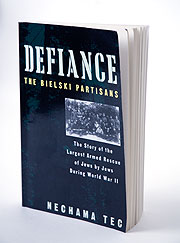  |
| HOME | THIS ISSUE | CALENDAR | GRANTS | BACK ISSUES | < BACK | NEXT > |
Sociologist’s book to become movieDepicts rescue of Jews by Jews in World War II by Beth Krane - October 1, 2007 |
||||
| In the dense forests of Lithuania, filming began this month on a major motion picture based on a book by Nechama Tec, professor emerita of sociology at the Stamford campus. Defiance, the name of the book and the movie, tells the story of the largest armed rescue of Jews by Jews during World War II.
Tec, a noted Holocaust scholar and two-time Pulitzer Prize nominee, sold the movie rights for her fourth book to Academy Award-winning director and producer Edward Zwick, whose credits include Glory, Shakespeare in Love, and Blood Diamond. Zwick is writing, directing, and producing the movie, which has a $50 million budget. Tec’s son, Roland Tec, an independent film maker, is co-producing the movie with Zwick. British actor Daniel Craig, the current James Bond 007, portrays Tuvia Bielski, the bold and charismatic leader of the resistance group that came to be known as the Bielski Partisans. Tec says she researched and wrote Defiance to correct a distortion and offset an omission of history. According to her, the distortion is the prevailing image of European Jews as victims who went passively to their deaths. The historical omission is the conspicuous silence about Jews who, while themselves threatened with murder, saved the lives of others. Tec’s research for the book included review of archival materials, direct interviews with members of the Bielski Partisans and other World War II resistance groups, and an interview with Tuvia Bielski in his Brooklyn home in 1987 just two weeks before he died. Published by Oxford University Press in 1993, Defiance details how a trio of brothers (Asael, Zus and Tuvia Bielski) who vowed to keep themselves and their families from certain death in the Nazi ghettos, swelled into a Belorussian forest community of over 1,200 Jews, with a mission that morphed over time from self-preservation to saving as many lives as possible. Tuvia distinguished the Bielski Partisans from other World War II resistance groups in several ways, Tec stresses. As head of the group, Tuvia established an open door policy of accepting all Jews, regardless of sex, age, or health. As he grew increasingly confident about his group’s prospects for survival, Tuvia then concentrated on saving the lives of others, Tec says: “He often said, ‘It is more important to save one old Jew than to kill 10 Germans.’” She says the Bielski unit illustrates the positive power of cooperative efforts. “Cooperation did not guarantee life. Many people who bonded with others in their struggle for survival still died. But those who survived, they could not have survived in isolation.” Tec says the self-educated Tuvia typified the unlikely yet charismatic leaders that arise in times of social upheaval. “He filled the room with himself, he had so much charisma even right before his death,” Tec recalls from her sole meeting with him. Defiance won two literary awards, including the International Ann Frank Prize in 1994. Tec’s most recent book, Resilience and Courage: Women, Men, and the Holocaust (Yale University Press 2003), was nominated for the Pulitzer Prize and the National Book Award. An earlier book, In the Lion’s Den: The Life of Oswald Rufeisen (Oxford University Press 1990), was also nominated for the Pulitzer Prize and received the Christopher Award. The film Defiance has a 2008 release date. |
| ADVANCE HOME |

